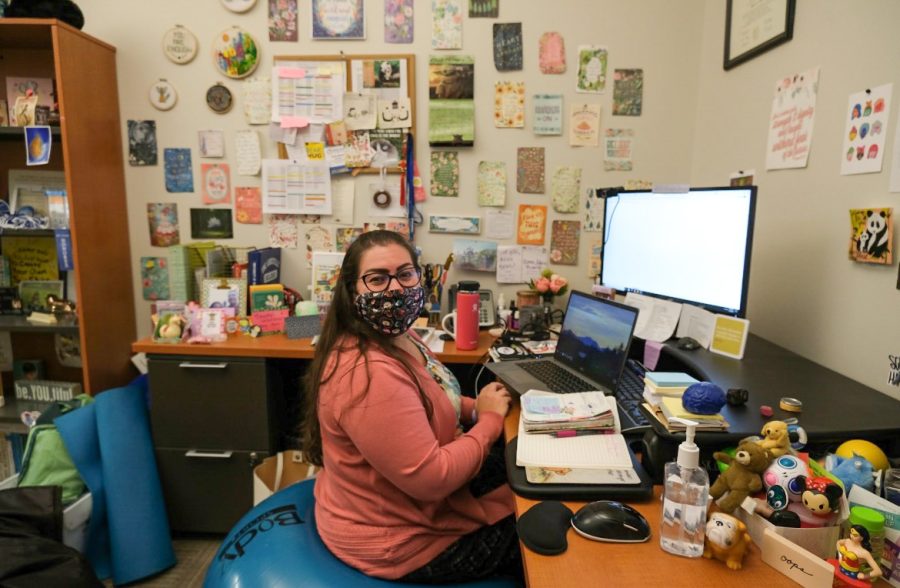Homesickness threatens UNCA students who expected different college experience
Anne Marie Robers, associate director of advising, provides resources for student success at UNCA.
February 23, 2022
With a never-ending pandemic altering classes and campus life, it’s easy to see why students become vulnerable to homesickness when college life does not meet their expectations.
“So much of Asheville feels performative. It feels competitive and expensive and exclusive in ways I wasn’t expecting. I don’t think Asheville is really portrayed like that until you live here,” said Cassidy Wells, first-year student from Hillsborough, North Carolina.
UNC Asheville Academic Adviser Katie Kitchens said the university recognizes homesickness as an issue, especially for first-year students starting college. Since UNCA offers a unique liberal arts curriculum, it can be a confusing environment for new students to adapt to, she said.
Wells said she decided on UNCA because the small campus size would allow for a tight-knit community. When she toured the school before applying, she was drawn to the numerous events on the quad and the lively student presence.
“Now by 6 p.m. on campus, it’s dead. I walk into the library, and I am the only person in there on a Wednesday night,” Wells said.
She initially thought the quieter campus was due to COVID-19, but as UNCA continues working toward opening campus and reimplementing pre-pandemic practices, Wells said she continues to see a lack of student presence on campus.
“When a student doesn’t feel engaged in a university as a whole, it’s hard to not have that feeling bleed over into classroom settings too and it’s hard to not feel alienated. You’re surrounded by people constantly, but you’re not connected to them,” Kitchens said.
Many UNCA students return home on weekends since the majority of the student body includes in-state residents. Because of this, weekends at UNCA tend to be much quieter than at other schools which offer sporting events and various weekend activities to keep students connected to campuses, Kitchens said.
According to Student Affairs Case Manager Co-Kema Hines, it is not always unmet expectations that cause students to experience a disconnect with the community. Many students say they feel overwhelmed by the new freedom that college offers.
“Oftentimes, new students will prioritize their social life instead of their academic obligations, and this can cause students to fall behind,” Hines said.
Hines said she understands social life in college is important, but many new students aren’t anticipating the amount of work and time needed to succeed in college courses. This underestimation creates a stressful environment, and homesickness tends to increase for first-years.
Academic stress and social isolation serve as two main contributing factors to homesickness. According to Kitchens, learning to make new friends, as arbitrary as it seems, also creates major challenges when assimilating to a new campus and a new life altogether.
“The tough part for freshmen is that you’re coming from this warm nest of high school with friends and students who they’ve often known for years, and now, that comfortability is gone,” Kitchens said.
After her first few weeks at UNCA, Wells said transferring was constantly on her mind. She said she felt like she was either going to stick out the school year with the possibility of not passing all her classes, or she was going to drop out.
“In college, everything is more nit-picky. It feels like more work and effort because so much of it is on my own time and I need to have the self-motivation to get it done. If I don’t, I fall behind and feel like I just can’t catch up,” Wells said.
University statistics show UNCA’s first-year retention rate of full-time students is 76% compared to the national average.
Finding a community that is best suited to the individual student is necessary. Kitchens said she sees first-years struggle to push through challenging spots during the first year of college, but especially during the first semester. Many students end up taking time off because they aren’t fully committed to being in college yet. Others transfer to a different institution altogether.
Wells said she still considered transferring after the fall semester, but took personal steps to end the term on a good note and bring the same mentality into the start of the spring semester.
“I’m very conscious about not being in my dorm for long periods of time. Instead, I go to the library, walk around campus or grab food with friends. Even though I’m not always engaging in social activities on or around campus, I’m trying to make an effort to engage with the physical campus itself,” Wells said.
College creates independence, but it doesn’t mean that students must face every challenge alone. Wells said other students experiencing homesickness should talk to RAs, seek out academic advisers and contact the counseling center if they’re struggling.
“Everyone is different in their college experience. We as a university want to support them however we can. We’re here, we’re listening and we want to know from students what we should do,” Kitchens said.


















